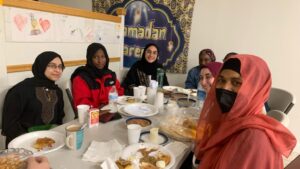Whenever we guide others on a path or journey, whether spiritual or physical, it is a great responsibility for the appointed leader. The Center for Religious and Spiritual Life holds this sacred role dear to its heart. Students know when the journey has gone off course and will eventually share their discontent and dissatisfaction to express their profound truth. To some extent, our role as religious advisers is like the role of a shepherd; both supporting the well-being of the whole herd yet also making sure no one is left inadvertently out of the fold.
 Ramadan requires the collaboration of many different centers and departments with CRSL from Dining, to Facilities, to Residence Life, to the Office of Student Engagement, just to name a few. Throughout the month we work hand in hand with leaders of Al Iman, Smith’s Muslim Student Association. This year the planning for Ramadan emerged somewhat differently than in past years. Students shared with CRSL in early September hidden issues that they felt interfered with their Ramadan experience. Ramadan, the annual sacred period of spiritual renewal for Muslims, involves not only fasting from dawn to sunset, but additional prayers and continuous self-reflection. Muslim student leaders shared that Muslim students were seeking more support from faculty, staff and their fellow Smithies during Ramadan. Being away from families and community festivities during this time can fuel a sense of personal loneliness and isolation. The fatigue and stress caused by fasting and long nights can exacerbate feelings of vulnerability for observant students.
Ramadan requires the collaboration of many different centers and departments with CRSL from Dining, to Facilities, to Residence Life, to the Office of Student Engagement, just to name a few. Throughout the month we work hand in hand with leaders of Al Iman, Smith’s Muslim Student Association. This year the planning for Ramadan emerged somewhat differently than in past years. Students shared with CRSL in early September hidden issues that they felt interfered with their Ramadan experience. Ramadan, the annual sacred period of spiritual renewal for Muslims, involves not only fasting from dawn to sunset, but additional prayers and continuous self-reflection. Muslim student leaders shared that Muslim students were seeking more support from faculty, staff and their fellow Smithies during Ramadan. Being away from families and community festivities during this time can fuel a sense of personal loneliness and isolation. The fatigue and stress caused by fasting and long nights can exacerbate feelings of vulnerability for observant students.
For this Ramadan we sought to make extra efforts to respond to student reports of their needs and experiences by taking steps to help validate and normalize practices and Muslim identity. After conducting a survey designed to provide specific information and insight about student wants and needs, we, the CRSL explored various avenues to improve students’ experience of Ramadan at Smith. We brought two religion professors from Hartford International University for Religion and Peace, Dr. Bilal Ansari and Dr. Colleen Keyes, to present a Ramadan awareness workshop for the Smith community. The dynamic husband and wife team talked about the sanctitude of Ramadan, and the best ways to request religious considerations from faculty when students need to be absent from class or require an assignment extension. They also discussed the importance of Ramadan iftars (break fast) to support students on campus. Student panelists spoke of extreme exhaustion from simultaneously attending to their nightly prayers and other obligations, while staying on top of their academics and other school activities. During the Q&A portion of the workshop students spoke up about not feeling welcomed in the past to take time off to attend the Eid celebration, the culmination festival at the end of Ramadan.
This year during Ramadan, which began on March 22 and ended April 20, more than 10 iftars were held, some organized by student volunteers, some by the CRSL, one jointly celebrated with the Smith College Jewish Community to mark the end of Passover and Ramadan, and another sponsored by the Lewis Global Studies Center. As the prayer schedule intensified through the month, students attended the Hampshire Mosque, sometimes twice in a night for the late-night prayers, using Smith vans from the Jandon Center for Community Engagement. Because Muslim students are not monolithic in their faith, we provided transportation to mosques accommodating Muslims from various sects whose practices differ from those provided at the local mosque.
The vibrancy, heartfelt gratitude and genuine community building generated this year cannot be understated. Students voiced their deep appreciation for the chance to make traditional chicken biryani, peach cobbler, and date smoothies in the newly renovated chapel kitchen, which was offered to observant students by reservation. They valued receiving microfridges, sponsored by the CRSL, which enabled them to eat Suhur (breakfast) at 4:00 am in their rooms and dinner after the dining halls had closed for the night. They smiled and laughed as they tasted each other’s lovingly prepared food dishes, watched videos in Bodman Lounge, drank home-made chai and stacked plates in the dishwasher. They enjoyed being treated to take out for some of the iftars, spending time hanging out with each other, and celebrating EID outdoors with Muslims from the wider community – a major part of how Ramadan is practiced with their families. They were sincerely appreciative for the small but meaningful changes brought forward by our collaborative efforts.
Long ago Prophet Muhammad entrusted leaders with the responsibility of being shepherds over their community. “Every one of you is a shepherd and is responsible for his flock,” he told his companions. This year we were committed to listening to our Muslim students and creating a particularly robust partnership. Perhaps we came a little closer to fulfilling our sacred role.
